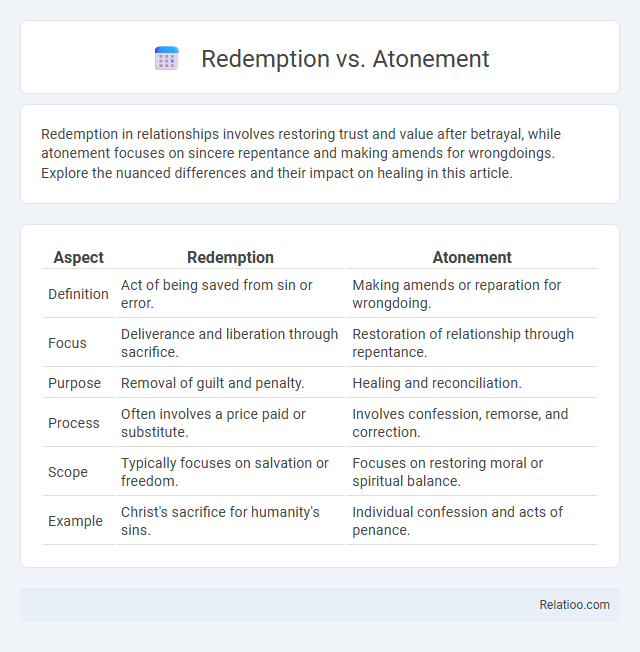Redemption in relationships involves restoring trust and value after betrayal, while atonement focuses on sincere repentance and making amends for wrongdoings. Explore the nuanced differences and their impact on healing in this article.
Table of Comparison
| Aspect | Redemption | Atonement |
|---|---|---|
| Definition | Act of being saved from sin or error. | Making amends or reparation for wrongdoing. |
| Focus | Deliverance and liberation through sacrifice. | Restoration of relationship through repentance. |
| Purpose | Removal of guilt and penalty. | Healing and reconciliation. |
| Process | Often involves a price paid or substitute. | Involves confession, remorse, and correction. |
| Scope | Typically focuses on salvation or freedom. | Focuses on restoring moral or spiritual balance. |
| Example | Christ's sacrifice for humanity's sins. | Individual confession and acts of penance. |
Understanding Redemption: Definition and Origins
Redemption refers to the act of being saved from sin, error, or evil, often implying a repayment or release from bondage, with roots in religious and legal contexts tracing back to Latin "redimere," meaning "to buy back." Atonement specifically involves making amends for wrongdoing or sin, emphasizing reconciliation between the offender and the offended, particularly in theological frameworks. Your understanding of redemption deepens by recognizing its historical use in spiritual liberation and legal transactions, highlighting its role in restoring your freedom and value.
What is Atonement? Key Concepts Explained
Atonement refers to the process of reconciling a relationship between humanity and the divine through the forgiveness of sins, often achieved by repentance, sacrifice, or acts of penance. Key concepts of atonement include substitutionary atonement, where a sacrificial figure takes on the punishment for others' sins, and moral influence theory, emphasizing transformation and ethical improvement. The term distinguishes itself from redemption, which implies liberation from bondage or sin, by focusing specifically on repairing the broken relationship caused by sin.
Redemption vs Atonement: Core Differences
Redemption involves the act of being saved from sin or evil, often implying a price paid or a rescue from bondage, while atonement specifically refers to the reconciliation between God and humanity through the forgiveness of sins. Your understanding of Redemption emphasizes deliverance and liberation, whereas Atonement highlights making amends or reparations to restore a broken relationship. These core differences shape how each concept is applied in theological contexts and personal beliefs.
Historical Perspectives: Redemption and Atonement in Religion
Redemption and atonement hold distinct yet interconnected roles in religious history, where redemption often signifies liberation from sin or bondage through a divine act, while atonement involves reconciling with God by addressing sin's consequences. Historically, Judaic traditions emphasize atonement through sacrificial rites such as Yom Kippur's ritual, whereas Christian theology centers on redemption through Jesus Christ's sacrificial death, symbolizing ultimate salvation. These terms reflect theological developments across centuries, highlighting evolving understandings of human-divine relationships and spiritual restoration in various faiths.
Theological Interpretations of Redemption
Redemption in theological interpretations emphasizes deliverance from sin through the sacrificial death of Christ, highlighting a transactional release akin to a ransom paid for Your salvation. Atonement focuses on the reconciliation between God and humanity, addressing the satisfaction of divine justice and the restoration of fellowship. While both concepts intersect, redemption primarily underscores liberation and ownership restoration, whereas atonement stresses the legal and relational repair accomplished by Jesus' sacrifice.
The Role of Atonement in Spiritual Transformation
Atonement serves as a pivotal process in spiritual transformation by facilitating reconciliation between the individual and the divine, enabling healing of spiritual breaches caused by sin. Unlike redemption, which emphasizes liberation from bondage, atonement focuses on restoring the broken relationship through acts of repentance and grace. This restoration cultivates inner renewal, fostering profound personal growth and alignment with spiritual truths.
Redemption and Atonement in Literature and Media
Redemption in literature and media often portrays a character's journey from moral failure or sin to renewal and forgiveness, emphasizing transformation and personal growth. Atonement, by contrast, centers on the act of making amends for wrongdoings, highlighting themes of guilt, responsibility, and reconciliation within a narrative. Your understanding of these concepts enhances interpretations of character development and plot resolutions where redemption offers hope, and atonement demands accountability.
Psychological Aspects: Seeking Redemption vs Pursuing Atonement
Seeking redemption involves a psychological journey of self-forgiveness and restoring one's sense of moral integrity after wrongdoing. Pursuing atonement emphasizes taking responsibility and making reparative actions to alleviate guilt and emotional distress. Your mental well-being benefits when redemption focuses on internal healing, while atonement often facilitates social reconciliation and emotional closure.
Redemption and Atonement in Modern Society
Redemption in modern society often symbolizes personal transformation and liberation from past mistakes, emphasizing empowerment and second chances. Atonement, by contrast, centers on acknowledging wrongdoing and seeking forgiveness to restore moral balance within communities. Both concepts intersect in contemporary discussions of justice and reconciliation, highlighting the importance of accountability alongside recovery.
Redemption or Atonement: Which Path Leads to True Healing?
Redemption and atonement both offer pathways to true healing, but they differ significantly in approach and impact. Redemption emphasizes liberation from past mistakes through forgiveness and transformation, allowing your spirit to find renewal. Atonement focuses on acknowledging wrongdoing and making amends, fostering inner peace and reconciliation with others for lasting emotional restoration.

Infographic: Redemption vs Atonement
 relatioo.com
relatioo.com